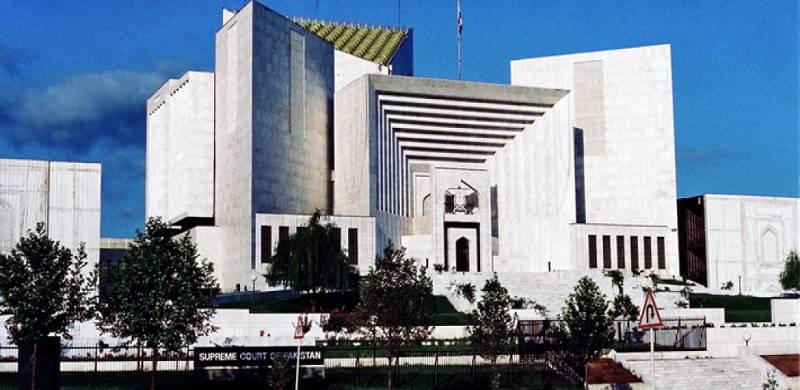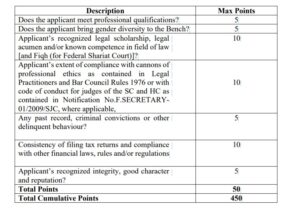
The Women in Law Initiative Pakistan issued press release and alternative proposal for judicial appointments reform. The following is an abridged version of their full proposal.
The Women in Law Initiative Pakistan welcomes the nomination of the first female judge to the Supreme Court of Pakistan and hopes that the approval of her nomination by the Judicial Commission of Pakistan (JCP) at its meeting dated January 6, 2022 marks the first step of many more to come, towards a more inclusive and gender diverse apex judiciary.
During this process many valid concerns over lack of transparency and gender diversity were raised, sparking a critical debate on wider issues of reform to the judicial appointments process. As female lawyers, who currently have negligible representation in bar councils and bar associations, we have strived to make our voices heard and to participate meaningfully in this momentous debate.
While we see the approval of Justice Ayesha Malik by the JCP as an encouraging sign, we are cognisant of the fact that the efforts for holistic reforms towards transparency and representation do not end here, they start here. The engagement with the larger issues regarding lack of female representation in the higher judiciary must continue.
In light of this, the Women in Law Initiative Pakistan has proposed the alternative principles and process for judicial appointments.
The main features of our proposal are:
We firmly believe that any reforms that introduce eligibility criteria based on rigid technicalities (e.g. years of practice, number of cases, etc.) seriously impair the chances of appointment of female lawyers as they fail to account for the cyclical nature of their careers, navigating caregiving responsibilities and professional achievements. Such criteria is not a healthy reform for the institution of judiciary or for Pakistan and would exacerbate existing inequities.
Globally, we have seen a move towards active commitment of Judicial Appointments Commissions in the UK, South Africa, Canada and other countries towards a publicly declared process, applications-based model and a stated commitment to diversity and inclusion. Our Constitution Articles 25 and 34 also call upon the State of which judiciary is a pillar to ensure participation of women in national life through affirmative action where required.
Therefore,
Desirous of making the legal profession more transparent, inclusive, equitable and accessible;
Recognizing the need for reforms in the existing process of judicial nominations and appointments which is arbitrary and lacks transparency;
Acknowledging the need for restoring confidence in the judiciary and its appointments process among the members of the Bar and public at large;
Recognizing the need for affirmative actions for representation as a step towards restoration of such confidence;
Noting that women are seriously under-represented in the legal profession and face systemic challenges as regards their advancement in law such as harassment, discriminatory practices, inherent biases and other non-conducive working arrangements;
Concerned that in the 74 years of its independence, there has been no female judge of the Supreme Court of Pakistan and no representation of women in the Pakistan Bar Council;
Highlighting further that women make up only about 5.3% of the senior judiciary at High Court level and only 2% women are represented in the provincial bar councils;
Noting further that the Legal Practitioner’s and Bar Council Act 1973 ensures no discrimination of ‘admission’ of women on basis of their gender but lacks in providing any express provisions on ensuring a gender balanced composition of the regulatory body of the profession that currently does not adequately reflect nor represent the women and their voices in the legal profession;
Now therefore, propose the following principles for judicial appointments and process:
Process
There should be an open and a publicly declared process for inviting applications against actual or upcoming judicial vacancies;
Application and Candidature
Judges should be actively recruited instead of being nominated on the basis of an applications-based model as opposed to a nominations-based model;
Preliminary Checklist
The following preliminary checklist shall be adopted by designated staff member for each application received against a vacancy before it can be considered by the members of the JCP:
Points System
Each application should be given points individually by each member of the JCP out of a total of 50 points each divided as follows:

Pipeline
Ensuring a diverse and qualified pipeline of eligible candidates is a continuous process therefore, concerted and active efforts for outreach, training and capacity building of potential candidates at all times should be part of the process and among the responsibilities of the Judicial Commission of Pakistan.
Standing Committee on Diversity and Inclusion
A Standing Committee on Diversity and Inclusion should be established to work in tandem with the Judicial Commission of Pakistan with the mandate to improve the disparity, design, develop or undertake, monitor and evaluate initiatives to improve the pipeline of eligible candidates for recruitments in the higher judiciary;
Basic Principles
The Women in Law Initiative Pakistan welcomes the nomination of the first female judge to the Supreme Court of Pakistan and hopes that the approval of her nomination by the Judicial Commission of Pakistan (JCP) at its meeting dated January 6, 2022 marks the first step of many more to come, towards a more inclusive and gender diverse apex judiciary.
During this process many valid concerns over lack of transparency and gender diversity were raised, sparking a critical debate on wider issues of reform to the judicial appointments process. As female lawyers, who currently have negligible representation in bar councils and bar associations, we have strived to make our voices heard and to participate meaningfully in this momentous debate.
While we see the approval of Justice Ayesha Malik by the JCP as an encouraging sign, we are cognisant of the fact that the efforts for holistic reforms towards transparency and representation do not end here, they start here. The engagement with the larger issues regarding lack of female representation in the higher judiciary must continue.
In light of this, the Women in Law Initiative Pakistan has proposed the alternative principles and process for judicial appointments.
The main features of our proposal are:
- Paradigm Shift from Nominations-Based to an Applications-Based Model
- Points Based System per Application
- Wider Pool of Candidates
- Publicly Declared Commitment to Gender Diversity and Inclusion
- Standing Committee to render Support to improve the Pipeline of Diverse Candidates and to be more Inclusive.
We firmly believe that any reforms that introduce eligibility criteria based on rigid technicalities (e.g. years of practice, number of cases, etc.) seriously impair the chances of appointment of female lawyers as they fail to account for the cyclical nature of their careers, navigating caregiving responsibilities and professional achievements. Such criteria is not a healthy reform for the institution of judiciary or for Pakistan and would exacerbate existing inequities.
Globally, we have seen a move towards active commitment of Judicial Appointments Commissions in the UK, South Africa, Canada and other countries towards a publicly declared process, applications-based model and a stated commitment to diversity and inclusion. Our Constitution Articles 25 and 34 also call upon the State of which judiciary is a pillar to ensure participation of women in national life through affirmative action where required.
Therefore,
Desirous of making the legal profession more transparent, inclusive, equitable and accessible;
Recognizing the need for reforms in the existing process of judicial nominations and appointments which is arbitrary and lacks transparency;
Acknowledging the need for restoring confidence in the judiciary and its appointments process among the members of the Bar and public at large;
Recognizing the need for affirmative actions for representation as a step towards restoration of such confidence;
Noting that women are seriously under-represented in the legal profession and face systemic challenges as regards their advancement in law such as harassment, discriminatory practices, inherent biases and other non-conducive working arrangements;
Concerned that in the 74 years of its independence, there has been no female judge of the Supreme Court of Pakistan and no representation of women in the Pakistan Bar Council;
Highlighting further that women make up only about 5.3% of the senior judiciary at High Court level and only 2% women are represented in the provincial bar councils;
Noting further that the Legal Practitioner’s and Bar Council Act 1973 ensures no discrimination of ‘admission’ of women on basis of their gender but lacks in providing any express provisions on ensuring a gender balanced composition of the regulatory body of the profession that currently does not adequately reflect nor represent the women and their voices in the legal profession;
Now therefore, propose the following principles for judicial appointments and process:
Process
There should be an open and a publicly declared process for inviting applications against actual or upcoming judicial vacancies;
Application and Candidature
Judges should be actively recruited instead of being nominated on the basis of an applications-based model as opposed to a nominations-based model;
Preliminary Checklist
The following preliminary checklist shall be adopted by designated staff member for each application received against a vacancy before it can be considered by the members of the JCP:
- Whether the candidate meets basic professional qualifications for the position?
- Whether the application and the documents required is complete or not?
- Whether the application has been received within the stated deadline or not?
Points System
Each application should be given points individually by each member of the JCP out of a total of 50 points each divided as follows:

- The applicant securing the highest points out of a cumulative total of 450 should be recommended for appointment as a judge against the vacancy to the Parliamentary Committee.
- In case of a tie, the applicant bringing gender diversity to the Bench shall be preferred.
Pipeline
Ensuring a diverse and qualified pipeline of eligible candidates is a continuous process therefore, concerted and active efforts for outreach, training and capacity building of potential candidates at all times should be part of the process and among the responsibilities of the Judicial Commission of Pakistan.
Standing Committee on Diversity and Inclusion
A Standing Committee on Diversity and Inclusion should be established to work in tandem with the Judicial Commission of Pakistan with the mandate to improve the disparity, design, develop or undertake, monitor and evaluate initiatives to improve the pipeline of eligible candidates for recruitments in the higher judiciary;
Basic Principles
- Transparency
- Commitment to Diversity and Inclusion
- Merit
- Structured Process for Recruitment

